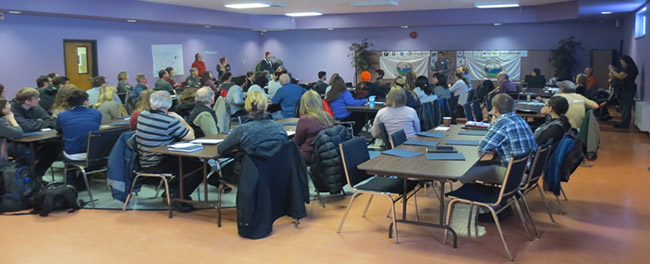Indigenous Lands and Resource Management conference held this week

By Rick Garrick
MAGNETAWAN — Chippewas of Nawash’s Anthony Chegahno will share his knowledge of the environment at Magnetewan second annual Indigenous Lands and Resource Management Conference on April 6.
“He will be speaking about species at risk from an traditional perspective,” says Cory Kozmik, Magnetawan’s species at risk biologist and program coordinator. “He will be giving a talk titled: Are We Keepers of the Earth? Is it our responsibility to take care of Mother Earth?”
A former band councillor, Chegahno has worked as a resource technician with Parks Canada’s Species at Risk program and an Aboriginal liaison between Chippewas of Nawash Unceded First Nation and Parks Canada. He now works as the species at risk project manager for his community.
The conference is an opportunity for researchers, conservationists and land managers to showcase species at risk projects and research activities taking place in First Nations communities.
“One of the speakers is a masters student from McMaster (University) who has been doing research on the hydrologic and thermal dynamics of moss on rock barrens and the implications for endangered reptile habitat,” Kozmik says. “It will be really interesting and beneficial for Magnetawan and other communities to learn of the new research happening here on this land.”
Other presenters include Walpole Island’s Clint Jacobs on the Swan Lake Marsh restoration project, Nipissing’s Clint Couchie on fisheries legislation, Ministry of Natural Resources and Forestry herpetologist Joe Crowley and Tom Hilditch, owner of an environmental company hired by Henvey Inlet to implement mitigation and safety measures for species at risk related to their wind energy project.
“That is important because it will give everybody a better idea of what is happening and what is being done environmentally to protect species at risk and to compensate for development,” Kozmik says.
The conference will be held at the Magnetawan First Nation Community Hall with a focus on species-at-risk conservation and research.
“The conference provides an opportunity for First Nation communities to build partnerships and a stronger network supporting the greater cause of natural resources and land management,” Kozmik says. “The success to me will be everybody coming together to learn, share ideas and initiatives of natural resource and land management strategies being carried out in First Nations communities across Ontario.”
Although many First Nations communities are havens for species at risk, Kosmik says there are communities who do not yet have species-at-risk or natural resource management programs.
“We welcome those who are interested in learning to come learn about what is being done, and build partnerships and meet people who are able to help facilitate and support one another in hopes to successfully establish more initiatives across all First Nation communities,” Kozmik says. “It is very important for us that everyone has the opportunity to protect and support their land in the best way possible.”
Kozmik says invitations to the conference have been sent to First Nation communities across Ontario from Sault Ste. Marie to the Kawarthas, as well as conservation agencies, non-government agencies and government agencies such as the MNRF and Environment Canada.
“We’re trying to reach more people each year,” Kozmik says. “We’re using an Eventbrite page online, social media such as Facebook, and also e-mails and phone calls and word-of-mouth.”
The Eventbrite page is located at: http://www.eventbrite.ca/o/magnetawan-first-nation-7877579740.
“We have a series of presenters ranging from government, such as the Ministry of Natural Resources, to many First Nations in regards to natural resource management, conservation strategies, anything in relation to species-at-risk conservation,” Kozmik says. “We want to allow all First Nations and conservation-oriented agencies across Ontario to learn more about different strategies and initiatives that are being done and to develop a better network and partnership development across all of these different agencies and First Nations.”


